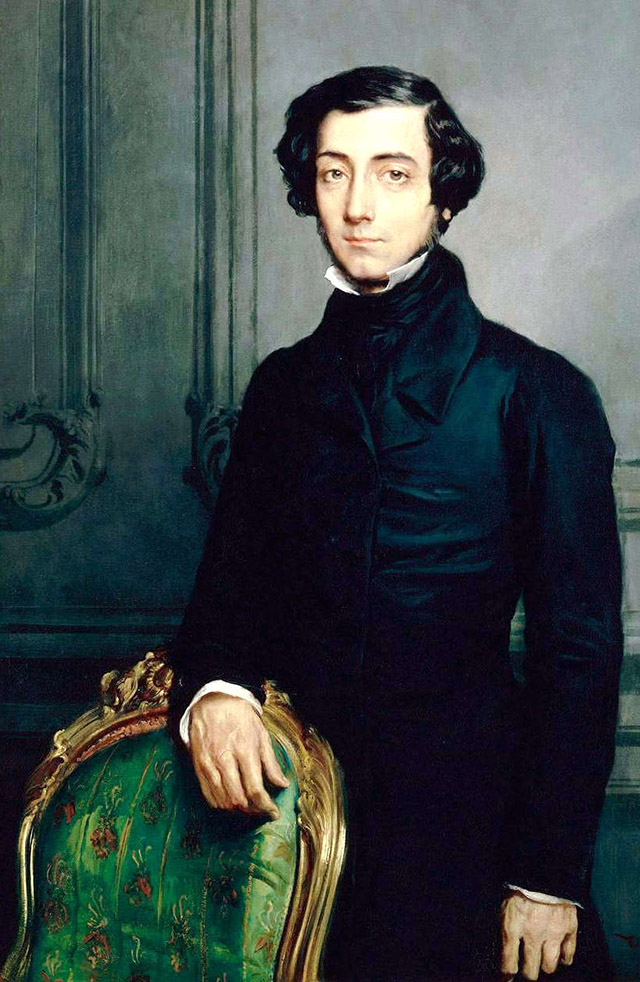This post originally appeared at The American Prospect.

Alexis de Tocqueville (Painting by Théodore Chassériau, Wikicommons)
To Tocqueville, who largely ignored the grim exception of the South, America’s progress toward greater equality was inevitable, the expansion of its democratic spirit unstoppable. Europe, he believed, would soon follow America’s lead. He was right — sort of. Democracy was on the rise, but so too was inequality. Only with the 20th century’s Great Depression, two terrible wars and the creation of the modern welfare state did concentrations of economic advantage in rich democracies start to dissipate and the fruits of rapid growth begin to accrue generously to ordinary workers.
Now another Frenchman with a panoramic vista — and far more precise evidence — wants us to think anew about the progress of equality and democracy. Though an heir to Tocqueville’s tradition of analytic history, Thomas Piketty has a message that could not be more different: Unless we act, inequality will grow much worse, eventually making a mockery of our democratic institutions. With wealth more and more concentrated, countries racing to cut taxes on capital and inheritance coming to rival entrepreneurship as a source of riches, a new patrimonial elite may prove as inevitable as Tocqueville once believed democratic equality was.
This forecast is based not on speculation but on facts assembled through prodigious research. Piketty’s startling numbers show that the share of national income coming from capital — once comfortingly believed to be stable — is on the rise. Private wealth has reached new highs relative to national income and is approaching levels of concentration not seen since before 1929.
Piketty’s powerful intellectual move is to place the subject of American income inequality in a broader historical and cross-national context. The forces most responsible for our egalitarian past, Piketty reminds us, were rapid growth — both of the population and of the economy overall. France never had the former, which is why it had a true “rentier” class of propertied aristocrats in the early 20th century when the United States was still a land of small-scale owners and the newly rich. Yet economic growth remains the biggest factor: When the economy expands modestly from year to year, returns on capital generally exceed the advance of labor income and fortunes of the already rich grow while the rest of society falls behind.
Since the resurgence of income inequality, concerned observers have comforted themselves with the notion that holdings of wealth — while far more unequally distributed than income — are not amassing at the top as quickly as incomes are. If we look forward, however, that reassuring notion appears suspect. Some of the great fortunes made in the new Gilded Age will fund philanthropy or frivolity. Most, however, will be funneled back into capital investment or passed on to heirs. Piketty notes that the returns of such investments are invariably largest for those with the greatest wealth — the Matthew effect is another force for increasing concentration. Meanwhile, inheritances are returning as a major source of advantage for the already advantaged. As rising income inequality passes down through a narrowing demographic pyramid, we can expect wealth bequests to become an increasingly important source of inherited privilege.
Piketty is rightly pessimistic about an immediate response. The influence of the wealthy on democratic politics and on how we think about merit and reward presents formidable obstacles. Fierce international competition for the rich and their dollars leads Piketty to believe that without a serious countermovement, capital taxation will trend toward zero. Inequality is becoming a “wicked” problem like climate change — one in which a solution must not only overcome powerful entrenched interests in individual countries but must be global in scope to be effective.
Nonetheless, it is capital taxation and ultimately global capital taxation, that Piketty sees as the eventual solution. Taxing only consumption and labor income violates the notion that citizens should finance the commonwealth on the basis of their ability to pay. A global capital tax — modest, progressive, based on transparency — could reinforce the fraying link between economic standing and individual contributions toward vital collective activities. Moreover, halting progress in this direction has already taken place, as rich countries seek — without great success so far — to crack down on the tax havens and corporate financial engineering that increasingly make taxes voluntary for the super rich. Because wealth is still so concentrated in advanced industrial nations, agreements that covered citizens of and transactions within Europe and North America would go a long way toward bringing these activities into the open. A modest tax on the largest fortunes might also encourage more productive uses of capital, gradually taxing away big estates with small returns.
Piketty suggests that the pressures for change will eventually prove overwhelming. Either ever-richer capitalists will tear one another apart in the race for diminishing returns, or the rest of society will rise up and impose a fairer framework. For a book that insists on the primacy of politics, however, Piketty has relatively little to say about how — with organized labor weakened, moneyed interests strengthened and anti-government forces emboldened — the kind of political movement necessary for a fairer future will emerge. (It was war, after all, not universal suffrage, that ultimately tamed inequality in the 20th century.) Yet perhaps with this magisterial book, the troubling realities Piketty unearths will become more visible and the rationalizations of the privileged that sustain them less dominant. Like Tocqueville, Piketty has given us a new image of ourselves. This time, it’s one we should resist, not welcome.



